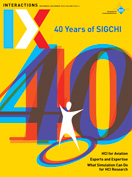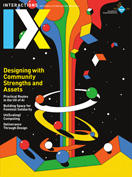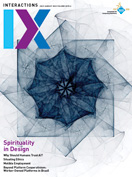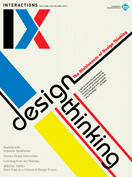Table of Contents
VOLUME XXV.3 May-June 2018
-
WELCOME
-
Coasts to coasts, Mumbai to Chicago
Gilbert Cockton, Simone Barbosa
As editors in chief, we aim to provide general readers with a broad range of content that extends awareness of the past and global present of interaction design (IxD) and HCI. In this issue, Jon Kolko's cover story looks to design's long past to identify qualities and practices that…
-
-
Demo Hour
-
Demo hour
Leslie García, Andrés Dómene, Thiago Hersan, Rodrigo Frenk, Marcela Armas, Arcángelo Constantini, Gilberto Esparza, Leo Nuñez
In 2017, for the first time in SIGGRAPH's history, the Art Gallery was dedicated exclusively to works by Latin American artists and designers: speculative artifacts that apply digital technologies to critically engage our present and map alternative futures [1]. The exhibition can be understood as an invitation to take…
-
-
What are you reading?
-
What are you reading? Paul Dourish
P. Dourish

I'm always a little shocked by just how little space there is in typical academic life for reading. Isn't that meant to be one of our core activities, along with those other seemingly extraneous activities, writing and thinking. These days, other than a few luxurious days at the end…
-
-
Blog@IX
-
My users taught me to read with my ears
Mario Romero

This blog post started as a response to the column What Are You Reading? in Interactions. While there are a number of books I wanted to discuss, the topic made me reflect on how I read. My reading mechanisms have evolved from working with blind people. I continue to…
-
-
How was it made?
-
How was it made? PaperMech
HyunJoo Oh, Mark Gross, Michael Eisenberg, Sherry Hsi

Describe what you made. PaperMech (aka FoldMecha) is a design system for exploring mechanical papercraft. It enables beginners to design simple mechanical movements by modifying parameters. They then download the parts to build the mechanisms and adapt them into their creations. Our website (www.papermech.net) provides assembly instructions and a…
-
-
Columns
-
A pragmatic turn in computer science
Clarisse de Souza

If I had a magic wand, I would use it to grant HCI a seat at the core of theoretical computer science. This might sound like a strange wish—even a presumptuous one. But I ask for it gently, with a wave of my hand, using the enchanted word Abracadabra.…
-
Is there a fix for impostor syndrome?
Elizabeth Churchill

"What do you do about stress?" she asked. "What do you mean by stress?" "Well... I feel like I will never fit in, like I'll never be smart enough. And that makes me stressed all the time. Does that make sense?" The young woman with whom I was speaking…
-
Modeling confidence
Jonathan Bean

What is it about the allure of measurement? For the past several years, as I have become more and more immersed in an ethnographic study of high-performance building, my predilection for precision and prediction has peaked. I just spent the better part of a weekend tweaking energy models in…
-
-
Day in the Lab
-
The connectivity lab, UMSI
Edward Happ

How would you describe your lab to visitors? The Connectivity Lab at the University of Michigan School of Information (UMSI) is focused on the question, "How do we solve problems when our A-list technologies are swept away?" Which is what happens during disasters. This lab provides a way for…
-
-
Forums
-
An intersectional approach to designing in the margins
Sheena Erete, Aarti Israni, Tawanna Dillahunt

We need to acknowledge, respect, and identify the ways in which participants [from underserved communities] can disrupt research. —workshop participant, "Reflection on Design Methods for Underserved Communities," CSCW 2017 Insights Recent HCI studies have emerged to account for the experiences and needs of underserved populations [1,2,3,4]. Focusing on…
-
Co-design in health: What can we learn from art therapy?
Anne Piper, Amanda Lazar

Driven by calls for democratizing design and empowering patients, researchers are turning to methods that involve users more directly in the design process. Methods such as participatory design and co-design provide a way of engaging individuals in the hands-on creation of their own health technologies. However, some of the…
-
The CX Tower of Babel: What CX descriptions tell us about corporate CX initiatives
Michael Thompson

While user experience (UX) has its share of fuzzily defined roles, I'm constantly amazed by my inability to use a customer experience (CX) job title to predict that role's responsibilities. This is both surprising and disappointing. Increasingly, both UX and CX profiles use similar vocabulary: voice of the customer…
-
Human-drone interaction: Let’s get ready for flying user interfaces
Markus Funk

Many advances in human-computer interaction (HCI) are driven by technological advances. Recently, a new category of devices became small enough, cheap enough, and robust enough to be available for the mass market: drones [1]. Insights Initially, drones were for non-civilian use, but over the past 10 years, they…
-
Sustainability, hope, and designerly action in the Anthropocene
Roy Bendor

Being optimistic is hard, and it seems to get harder by the day. Readers of this forum need no reminders, I'm sure, of the severity of our socio-environmental situation, and certainly have no use for platitudes about what needs to be done. As a community, we have been discussing…
-
-
Community square
-
ACM SIGCHI/EIT health summer school on user-centered design in e-health
Gavin Doherty, Åsa Cajander, Jan Gulliksen, Conor Linehan

Building on funding from the SIGCHI Summer/Winter Schools Program (2017), Trinity College Dublin and KTH in Stockholm, with support from Stockholms läns landsting, ran a summer school on the topic of e-health. It took place over the course of two weeks, the first in June in Dublin, the second…
-
-
Cover story
-
The divisiveness of design thinking
Jon Kolko

Design thinking is "kind of like syphilis," wrote Lee Vinsel of the Stevens Institute of Technology in a recent widely shared article [1]. Other popular critical perspectives on design thinking include designer Natasha Jen's "Design Thinking Is Bullshit" [2] and, as far back as 2011, Bruce Nussbaum's "Design Thinking…
-
- Special topic: Interact Comes to India: Field Trips as a Culture of Design Praxis
-
Calendar
-
Calendar
INTR Staff

June NIME: International Conference on New Interfaces for Musical Expression (Blacksburg, Virginia, USA) Conference Dates: June 3–6, 2018 http://www.nime2018.org DIS '18: Designing Interactive Systems Conference (Hong Kong) Conference Dates: June 9–13, 2018 http://dis2018.org ETRA '18: 2018 Symposium on Eye Tracking Research and Applications (Warsaw, Poland) Conference Dates: June 14–17,…
-
-
Exit
-
HOSPITAbLe:: New domestic landscape and the geographical shift of care
Paul Chamberlain

Contributor: Paul Chamberlain Curator/Editor: Rachel Clarke Genre: Critical design, furniture design, design for health, health technology In response to the inevitable future changes to our healthcare, HOSPITAbLe is a collection that challenges and reflects upon an ambiguous future domestic landscape that presents hybrid functionality and confused visual language and…
-



